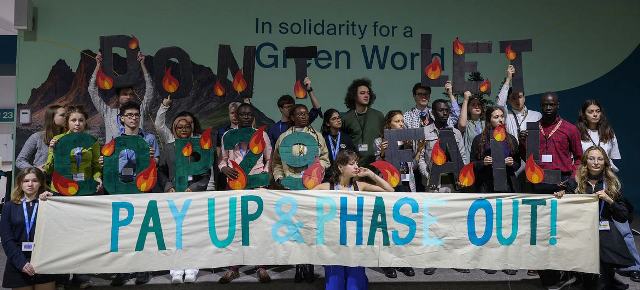The COP29 climate summit at Baku, Azerbaijan concluded two days past its deadline, delivering a global finance deal but leaving many climate advocates frustrated by missed opportunities and persistent roadblocks, Reuters news report said. Here’s a look at the major outcomes and setbacks from the two-week conference:
# 1 A Controversial Climate Finance Deal
After intense negotiations, nations agreed on a target of $300 billion annually by 2035 to support climate adaptation and mitigation in developing countries. However, many criticized the figure as insufficient, especially given the escalating impacts of climate change.
India and other nations expressed dismay at wealthy countries’ push to count contributions from developing economies in the finance tally, warning it could slow the global energy transition.
# 2 Donald Trump’s Shadow Looms
Donald Trump’s recent U.S. presidential election victory cast a pall over the summit. His promises to withdraw the United States from international climate efforts and appoint climate skeptics to key positions left negotiators uncertain about the world’s largest economy’s future role.
The U.S., historically the largest emitter of greenhouse gases, was notably muted at the summit, curbing ambition for the finance deal and raising concerns about future global collaboration.
# 3 Green Light for Carbon Credits
COP29 reached a milestone agreement on carbon credit trading after years of debate. The deal allows countries to develop a system for generating and trading carbon offsets to reduce emissions and fund climate projects.
While hailed as a potential financial boost, the agreement left details such as transparency standards unresolved, prompting questions about the system’s effectiveness and fairness.
# 4 Concerns Over Climate Action Stagnation
Despite years of negotiations, global emissions and temperatures continue to rise, exacerbating extreme weather events worldwide.
Africa experienced catastrophic flooding, displacing millions and killing thousands.
Landslides in Asia buried entire villages, while drought in South America devastated river systems critical for transportation and livelihoods.
In Europe and the U.S., flooding caused hundreds of deaths and billions of dollars in damages.
This year is set to become the hottest on record, a stark reminder that the pace of climate action remains woefully inadequate.
# 5 Trade Barriers Spark Debate
Developing nations spotlighted trade policies as obstacles to their climate ambitions. Europe’s Carbon Border Adjustment Mechanism (CBAM) and the potential for sweeping tariffs under Trump’s administration were highlighted as significant barriers to greening their economies.
The summit agreed to include climate-related trade barriers on future agendas, a move welcomed by many developing nations.
# 6 Fossil Fuel Interests Dominate
Held in another fossil fuel-producing country, COP29 failed to advance commitments from COP28 to phase out fossil fuels or triple renewable energy capacity by 2030.
The president of Azerbaijan and the OPEC secretary general both defended fossil fuel production, describing oil and gas as “gifts from God.” Critics argued this underscored the outsized influence of fossil fuel interests on climate negotiations.
# 7 A Mixed Outcome
While COP29 marked progress in areas like carbon markets and trade discussions, it left many critical issues unresolved. The slow pace of action and lack of stronger commitments to renewable energy underscore the challenges of balancing economic interests with urgent climate needs.
With the next COP set in Brazil’s Amazon region, the world will look to that summit to deliver more decisive action against a rapidly escalating climate crisis.

